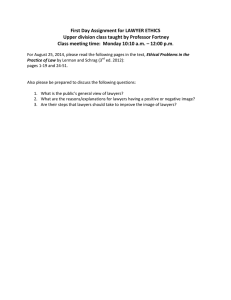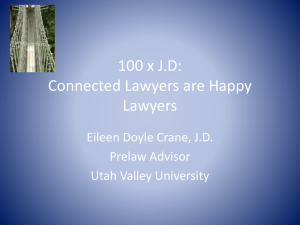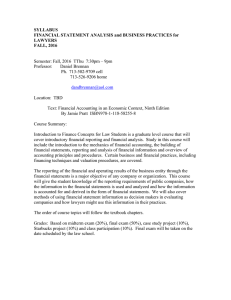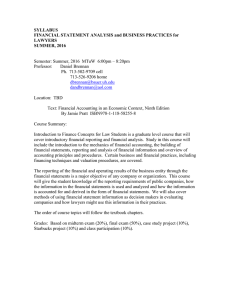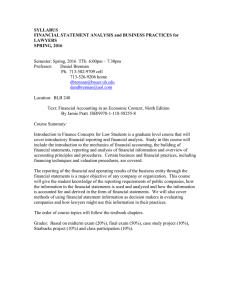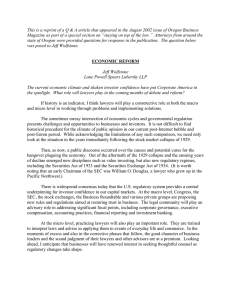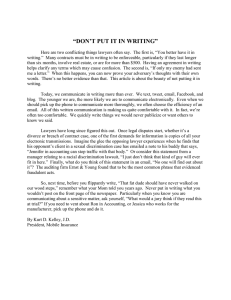Conference Program - American Bar Association
advertisement
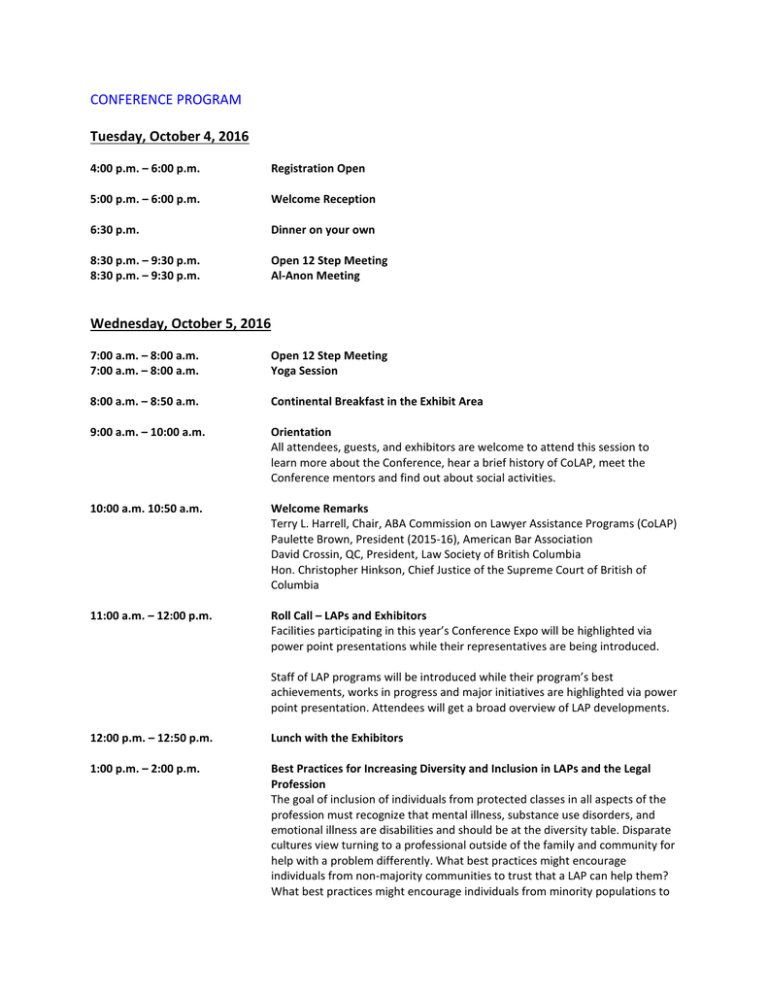
CONFERENCE PROGRAM Tuesday, October 4, 2016 4:00 p.m. – 6:00 p.m. Registration Open 5:00 p.m. – 6:00 p.m. Welcome Reception 6:30 p.m. Dinner on your own 8:30 p.m. – 9:30 p.m. 8:30 p.m. – 9:30 p.m. Open 12 Step Meeting Al-Anon Meeting Wednesday, October 5, 2016 7:00 a.m. – 8:00 a.m. 7:00 a.m. – 8:00 a.m. Open 12 Step Meeting Yoga Session 8:00 a.m. – 8:50 a.m. Continental Breakfast in the Exhibit Area 9:00 a.m. – 10:00 a.m. Orientation All attendees, guests, and exhibitors are welcome to attend this session to learn more about the Conference, hear a brief history of CoLAP, meet the Conference mentors and find out about social activities. 10:00 a.m. 10:50 a.m. Welcome Remarks Terry L. Harrell, Chair, ABA Commission on Lawyer Assistance Programs (CoLAP) Paulette Brown, President (2015-16), American Bar Association David Crossin, QC, President, Law Society of British Columbia Hon. Christopher Hinkson, Chief Justice of the Supreme Court of British of Columbia 11:00 a.m. – 12:00 p.m. Roll Call – LAPs and Exhibitors Facilities participating in this year’s Conference Expo will be highlighted via power point presentations while their representatives are being introduced. Staff of LAP programs will be introduced while their program’s best achievements, works in progress and major initiatives are highlighted via power point presentation. Attendees will get a broad overview of LAP developments. 12:00 p.m. – 12:50 p.m. Lunch with the Exhibitors 1:00 p.m. – 2:00 p.m. Best Practices for Increasing Diversity and Inclusion in LAPs and the Legal Profession The goal of inclusion of individuals from protected classes in all aspects of the profession must recognize that mental illness, substance use disorders, and emotional illness are disabilities and should be at the diversity table. Disparate cultures view turning to a professional outside of the family and community for help with a problem differently. What best practices might encourage individuals from non-majority communities to trust that a LAP can help them? What best practices might encourage individuals from minority populations to join the staff of or volunteer for LAPs? How do LAPs find a place at the diversity and inclusion table? What has helped members of the panel feel that they are supported in the legal profession? Speakers: Attendees will leave this session with insight not only for LAPs working with judges and lawyers with these disabilities and cultural concerns, but also for members of the legal community in understanding the diverse and cultural issues they face when seeking assistance. This program also provides insight and information for those attorneys representing lawyers and bar applicants with these disabilities in grievances, and character and fitness admission matters. Hon. Donald L. Allen, Member (2013-16), ABA Commission on Lawyer Assistance Programs and District Court Judge, 55th Judicial District Court, Ingham County Michigan Tish Vincent, MSW, JD, Program Administrator, Michigan Lawyers & Judges Assistance Program 2:00 pm -2:10 p.m. Break 2:15 p.m. – 3:30 p.m. How to Offend without Really Trying: The Ethics of Cultural Self-Awareness This presentation will explore how the counselor’s biases (often unconscious) can affect interactions with their clients. The focus will be on micro aggressions, which are subtle acts of bias. The goal of this program is not to eliminate biases, an impossible task, but to increase awareness of them so they do not interfere with the client’s progress. The challenge is that therapists often see themselves as fair and decent people. They are also in positions of power so they may miss the bias that occurs. Moreover, clients are less likely to confront their therapist due to this power dynamic. We will identify steps therapists can take to reduce bias or at least the impact of bias, and ways in which therapists who treat attorneys can explore and discuss bias with their attorney clients in the context of an attorney’s competence, implicit and explicit bias, and the requirements of ABA Model Rule of Professional Conduct Rule 1.1 and its correlation to Rule 8.4. This session will also provide insight for LAPs working with attorneys and respondent’s counsel in grievance matters. Michael Kahn, LPC, JD, Reel to Real Workshops Speaker: 3:30 p.m. – 4:00 p.m. Break in the Exhibit Hall 4:00 p.m. – 5:15 p.m. The Joyful Journey: How Lawyers Can Navigate Professional and Personal Suffering to Find Fulfilment This presentation will address how lawyers can incorporate techniques into their lives and practices that will enable them to live a more daring, joyful, and grateful life, despite the negatives that seem rife within our profession, making us more effective lawyers in the process. We will also discuss issues of substance use as it relates to attorneys and our clients. The presentation is not a theoretical or academic one. It is based on the “real life” experiences, techniques, and insights that we can immediately begin using in our daily lives, and how we use the techniques to better represent our clients. The program is designed to also deal with ethical situations that occur in our practices and how to avoid the pitfalls that many attorneys fall into. Speakers: Robert Bianchi, Esq., Partner, The Bianchi Law Group – Sponsored by DocuVault Dorothy O’Keefe-Diana, MSW, LCSW, Mental Health and Wellness Center of Madison – Sponsored by Caron Treatment Centers 5:30 pm Dinner on your own 8:00 p.m. – 9:30 p.m. CoLAP Salon and Hospitality Room CoLAP Salon - Think French Salon – A gathering of people under the same roof of an inspiring host, held partly to amuse one another and partly to refine the taste and increase the knowledge of the participants through conversation. For those of us who remember our high school or SAT Latin – aut delectare aut prodesse est (either to please or to educate). Join us for CoLAP’s modernized salon – a place to meet, muse, and share mirth. For those who would like to engage in “education,” we will have several hosts leading discussions on conference topics. For those seeking a place to please, you may share refreshments with colleagues as you create your own conversation. 9:30 p.m. – 10:30 p.m. 9:30 p.m. – 10:30 p.m. Open 12 Step Meeting Evening Meditation Session - Sponsored by Chopra Addiction and Wellness Center Thursday, October 6, 2016 7:00 a.m. – 8:00 a.m. 7:00 a.m. – 8:00 a.m. Open 12 Step Meeting Yoga - Sponsored by Chopra Addiction and Wellness Center 8:00 a.m. – 9:00 a.m. Breakfast Topics 9:15 a.m. – 10:30 a.m. Three Concurrent Sessions SESSION 1 True Stories of Inclusion, Wellness, and Joy as a Lawyer This positively focused presentation engages audience wisdom and shares playback theatre to explore, inspire, and teach the merits of strength based interventions. Stories of inclusion, joy, and success in overcoming challenges will be solicited from a progressively warmed-up audience. A small troupe of actors will play-back these scenes briefly and ingredients of inclusion, health, joy, and wellness will be highlighted. The merits of seeing positive action and strength-based interventions will be discussed from a neuroscience perspective. In addition, micro and macro experiential interventions in support of greater wellness will be modeled and described. Jeff Thompson, M.Ed., RCC, TEP, Coordinator of Clinical Services, Chopra Addiction and Wellness Center - Sponsored by Chopra Addiction and Wellness Center Speaker: SESSION 2 We Learn by Listening-Law Students Get Personal This presentation, sponsored by the CoLAP Law School Assistance Committee, will feature law students or recent graduates, who are receiving or have received individual assistance or services from their respective state’s assistance program. With their anonymity protected, these students will share their personal stories. We will hear their experience, strength and hope as they pursue their legal education, while struggling with addiction and/or mental health issues. They will also relate that when a helping hand was needed, a Lawyers Assistance Program was there. This uncensored breakout session will celebrate these brave students’ individual successes and highlight the necessity of a strong and proactive state assistance program. Moderators: Panelists: SESSION 3 Speakers: This session will also provide information about the resources necessary and available in preparing law students for character and fitness issues, and considerations in the pursuit of conditional admission, with respect to the bar application and admissions process. It will also provide a healthy opportunity for self-assessment, so that moving forward, we can better assist the future practitioners of this profession. Tom Roman, Member, Law School Assistance Committee, ABA Commission on Lawyers Assistance Programs Judith M. Rush, JD, Director of Mentor Externship, University of St. Thomas School of Law, Minneapolis, Minnesota Chase Andersen, Esq., Case Manager, Minnesota Lawyers Concerned for Lawyers Yvette Hourigan, Esq., Director, Kentucky Lawyer Assistance Program Robynn Moraites, Esq., Director, North Carolina Lawyer Assistance Program Using Acceptance Commitment Therapy (ACT) as an Initial Intervention in a Residential or Outpatient Drug and Alcohol Treatment Setting Acceptance Commitment Therapy (ACT) has been shown to be useful in the treatment of addictive disorders. The cornerstones of ACT include principles of mindfulness, remaining open to new ideas and moving toward one’s values rather than escaping one’s feelings. In short, accepting feelings rather than escaping them and moving toward values rather than toward suffering define the goals of this type of behavioral therapy. Introducing patients to these principles can be done early in drug and alcohol treatment and set the tone for ongoing therapy. This workshop will demonstrate practical techniques that can be used in any therapeutic setting. These same techniques can be integrated into practice to assist lawyers to engage in effective client communication and consider other aspects of the clients’ needs when advising them, pursuant to ABA Model Rules of Professional Conduct, 1.4 and 2.1. Joseph Troncale, MD, DFASAM., Medical Director, Retreat Premier Addiction Treatment Centers – Sponsored by Retreat Premier Addiction Treatment Centers Laurie J. Besden, Esq., Executive Director, Lawyers Concerned for Lawyers of Pennsylvania, Inc. 10:30 a.m. – 11:00 a.m. Break in the Exhibit Hall 11:00 a.m. – 12:15 p.m. Three Concurrent Sessions SESSION 1 LAPs and Treatment Providers: Best Practices for Experience, Strength and Hope LAP clients who access treatment are served most effectively when there is a strong partnership between the LAP and the provider. This process spans a continuum from identifying the right services and making the referral, to staying connected regarding the clients progress, to planning for aftercare and returning to the profession. Ethics, employment, legal, and other concerns are often present and need to be part of the conversation. Join LAP and provider representatives as they discuss two examples of effective collaboration. Also, share your own examples of best practices and recommendations for maximizing our opportunities to be better together. Moderator: Speakers: SESSION 2 Speakers: SESSION 3 Understanding treatment approaches and expectations can also help attorneys to realistically advise their clients on what to expect when treatment is part of a grievance/disciplinary matter, or employment, family, criminal or other case. Joan Bibelhausen, JD, Executive Director, Minnesota Lawyers Concerned for Lawyers Chelsy A. Castro, JD, MA, MSW, Clinical Case & Program Manager, Illinois Lawyers’ Assistance Program, Inc. Dr. Janet Hicks, Director of Professionals Program, Cornerstone of Recovery – Sponsored by Cornerstone of Recovery Cathy Killian, Clinical Director, North Carolina Lawyer Assistance Program Phillip A. Kosanovich, Executive Vice President & Chief Operating Officer, The Manor – Sponsored by The Manor Practicing Law with Attention Deficit/Hyperactivity Disorder (AD/HD): This presentation will define AD/HD, describe the professional challenges for lawyers with AD/HD, and discuss strategies and tools for managing these challenges. The presenters will describe the workshops and resources their respective programs have offered for lawyers with AD/HD. This session will provide valuable information not only for LAPs working with judges, lawyers and law students, but also the attorneys representing them in grievance matters and character and fitness matters. Mike Long, Attorney Counselor, Oregon Attorney Assistance Program Diane Markel, MS, LADC, Case Manager, Minnesota Lawyers Concerned for Lawyers Challenging Stigma to Encourage Lawyers and Judges to Seek Help Early The recent research has shown that stigma is the biggest reason lawyers do not seek help. The session will address some ideas to help reduce the stigma around mental health and addictions and help educate lawyers about how to overcome fear of stigma and avoid creating stigma. Speakers: 12:30 p.m. – 1:30 p.m. This session will provide insight not only for LAPs working with judges and lawyers, but also for members of the legal community to help promote wellness in our profession. Information provided will also be of assistance to attorneys representing lawyers and bar applicants in grievance matters and character and fitness matters. Derek C. LaCroix, QC, Executive Director, Lawyers Assistance Program of British Columbia Douglas Querin, Attorney Counselor, Oregon Attorney Assistance Program Elizabeth A. Rimmer, Chief Executive, LawCare (UK) Lunch 1:45 p.m. 3:00 p.m. Two Concurrent Sessions SESSION 1 We Get By With a Little Help From Our Friends The science of happiness teaches us that connections are a key component of happiness; could it also be that incorporating happiness practices into our personal and professional lives can enhance our ability to make connections? The work of lawyer assistance programs doesn’t happen in a vacuum; just as individuals need connection for optimal functioning, LAPs need allies to get our message out and get the job done. This interactive session will explore how we can all apply the science of happiness to improve our personal and professional lives and to build stronger connections with our LAP volunteers, other LAPs, bar associations, and other organizations. Come prepared to share what has worked for you; we can all learn from each other! Speakers: SESSION 2 This session will provide insight not only for LAPs working with those in the legal community in promoting wellness but will also provide valuable information for attorneys representing lawyers and bar applicants in matters wherein the LAP’s resources will be of great assistance. Laura McClendon, MA, CEAP, Executive Director, Tennessee Lawyers Assistance Program Loretta Oleksy, JD, LSW, Deputy Director, Indiana Judges and Lawyers Assistance Program Bridging The Gap: Helping Lawyers Transition From Working Full Time To Not Working At All For most lawyers, retirement preparation means more than just money; it means bridging the gap from working full-time to not working at all (retirement) while still meeting their obligations to their clients and their profession. Speakers: By assisting lawyers in designing, planning and implementing a plan for transition – we just may help them avoid the abrupt end of not knowing how, or when, to say good bye to the practice of law. This session will provide insight not only for LAPs working with judges and lawyers transitioning into retirement, but also the attorneys representing them in grievance matters that may result when one does not have a good retirement plan in place. Jennifer-Kate Aaronson, Esq., Chief Disciplinary Counsel, Delaware Office of Disciplinary Counsel Johnathan H. Mack, Psy.D., Forensic Psychology and Neuropsychology Services, P.C. R. Judson Scaggs, Esq., Chair, Delaware Lawyers Assistance Committee Carol P. Waldhauser, Esq., Executive Director, Delaware Lawyers Assistance Program 3:00 p.m. – 3:30 p.m. Break in the Exhibit Hall 3:30 p.m. – 4:45 p.m. Two Concurrent Sessions SESSION 1 Explanations Not Excuses: The Intersection of Lawyer Misconduct and Addiction – How Regulators and Assistance Programs Work Together Moderator: Panelists: SESSION 2 Moderator: Panelists: 7:00 p.m. – 9:00 p.m. 7:00 p.m. – 8:00 p.m. 8:00 p.m. Speaker: 9:30 p.m. – 10:30 p.m. 9:30 p.m. – 10:30 p.m. This presentation will focus on the relationship between traditional disciplinary or regulatory boards, counsel who are responsible for the investigation and prosecution of alleged misconduct by lawyers and judges, and lawyers and judges assistance programs designed to assist lawyers and judges with personal and professional challenges. Discussion will include how the different agencies interact and share information; the challenge of identifying when an addiction causes professional misconduct and the appropriate response by regulators; whether disciplinary or regulatory counsel do or should consider a lawyer’s or judge’s addictions or mental health issues in recommending and seeking disciplinary sanctions; and the difficult decisions faced by assistance professionals when a lawyer is causing significant harm to himself/herself, clients and the profession. Tracy Kepler, Esq., Member, ABA Commission on Lawyer Assistance Programs James C. Coyle, Esq., Regulation Counsel for the Colorado Supreme Court Aria Eee, Esq., Deputy Bar Counsel, Maine Board of Overseers of the Bar Barbara Ezyk, Esq., Executive Director, Colorado Lawyers Assistance Program William Kane, Esq., Director, New Jersey Lawyers Assistance Program William D. Slease, Esq., Chief Disciplinary Counsel, New Mexico Supreme Court Disciplinary Board Being a Zealous Advocate and Helping Other Lawyers A panel of lawyers will share their experiences in recovery and in helping others. The panel discussion will showcase how participating with ILAA, CoLAP and their local LAPs has helped them be better lawyers. This panel will provide personal views and insight for LAPs working with judges and lawyers as to the resources and assistance needed in order to be productive members of the legal profession and how they in turn are able to help others with similar issues. Information provided will also be of assistance to attorneys representing judges and lawyers in grievance matters. Cecie Hartigan, Esq., Executive Director, New Hampshire Lawyers Assistance Program Andrea Jones, JD, President, Lawyers Assistance Program of British Columbia Scott Meiklejohn, Esq., Vice-Chair, Colorado Lawyers Helping Lawyers Annual Conference Dinner at Stanley Park Pavilion Dinner and Presentation of the ABA Commission on Lawyer Assistance Programs’ Meritorious Service Award Francine W. Open 12 Step Meeting Evening Meditation Session - Sponsored by Chopra Addiction and Wellness Center Friday, October 7, 2016 7:00 a.m. – 8:00 a.m. 7:00 a.m. – 8:00 a.m. Conference Run/Walk Open 12 Step Meeting 8:30 a.m. – 12:00 p.m. ABA Commission on Lawyer Assistance Programs Business Meeting CEU The ABA Commission on Lawyer Assistance Programs is a NAADAC Approved Education Provider. Continuing Education Units (CEUs) for clinicians will be available. CLE The ABA directly applies for and ordinarily receives credit for live, in-person programs in AK, AL, AR, AZ, CA, CO, DE, GA, GU, HI, IA, IL, IN, KS, KY, LA, MN, MO, MT, MS, NC, ND, NH, NM, NV, NY, OH, OK, OR, PA, PR, SC, TN, TX, UT, VA, VI, VT, WA, WI, and WV. This transitional program is approved for both newly admitted and experienced attorneys in NY. Attorneys may be eligible to receive CLE credit through reciprocity or attorney self-submission in other states. For more information about CLE accreditation in your state, visit http://www.americanbar.org/cle/mandatory_cle.html. States typically decide whether a program qualifies for CLE credit in their jurisdiction 4-8 weeks after the program application is submitted. For many live events, credit approval is not received prior to the program.
